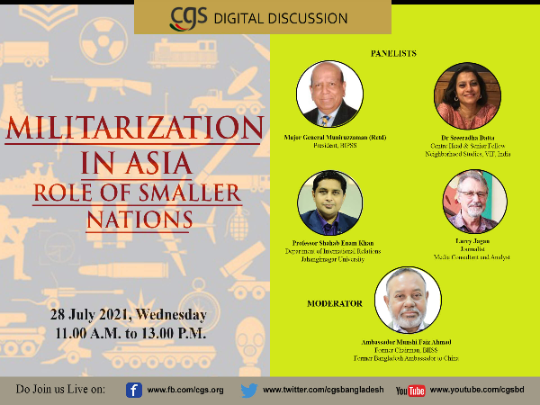Webinar on Militarization in Asia: Role of Smaller Nations
28 July 2021
Press Release
Militarization in Asia: Role of Smaller Nations
Centre for Governance Studies organized a webinar on “Militarization in Asia: Role of Smaller Nations” yesterday on 28th July, Wednesday. The webinar focused on the Quadrilateral Security Dialogue and its implications for Bangladesh.
Major General Muniruzzaman (Retd.), President, Bangladesh Institute of Peace and Security Studies (BIPSS); Dr. Sreeradha Datta, Centre Head & Senior Fellow, Neighborhood Studies, Vivekananda International Foundation (VIF), India; Mr. Larry Jagan, Former BBC World Service News Editor; Professor Shahab Enam Khan, Department of International Relations, Jahangirnagar University; and Dr. Maria Sultan, Director General, South Asian Strategic Stability Institute University, Pakistan, were the panelists at the event. The discussion was moderated by Ambassador Munshi Faiz Ahmad, Former Bangladesh Ambassador to China and former Chairman, BIISS.
Munshi Faiz Ahmad started off the discussion by raising several questions to the panelists about the magnitude and nature of militarization in Asia. Other interrogatives included whether to understand Asia as one unit or should it be seen in different parts? The trajectory of the discussion was set to cover the recent developments in South East Asia in regards to the formation of the Quadrilateral Security Dialogue (Quad) between the USA, India, Japan, and Australia. The discussion would particularly highlight the apparent inception of Quad to counteract China’s Belt and Road Initiative (BRI) in the form of joint military displays in the Indian Ocean. The key question asked by the moderator was whether this kind of competition could escalate to another cold war, or are there ways to avoid conflict?
Major General Muniruzzaman (Retd) ruminated on the myriad of potential conflict flashpoints in greater Asia and highlighted how the strategic tension between the USA and China might have an adverse effect on the stability of the region as new dimensions of competition are introduced into the fray (such as 5g, and Artificial Intelligence). He noted that such significant change in the security landscape of Asia-pacific is due to the rise of new world powers and there is a historical precedence of such competition leading to militarization. He highlighted that the nature of competition between the Quad and the BRI is currently more economical than militaristic. Regarding the role of smaller independent nations in the region such as Bangladesh, he emphasized the need to avoid any kind of partisan and military entanglements to ensure strategic autonomy and avoid escalation into a second cold war.
Larry Jagan talked in detail about the rising militarization in Myanmar after the February 2021 coup and stated that it is a more prominent security risk in Asia than the US-China rivalry over the Indian Ocean. He noted that China is not looking for allies in the BRI project, they are looking for partners. He also discussed that China is carrying out the BRI project to increase interconnectivity in Asia, which might, in turn, reduce the risk of conflict among nations, but it is still important to note that the BRI is not strictly an economic venture and there are several military implications to the project, such as BRI docks in other countries having possible submarine docking capabilities. Despite this, he argued that it is difficult to see increasing militarization in South East Asia, rather it is the modernization of Asian militaries to catch up to contemporary capabilities.
Dr. Sreeradha Datta directed attention to the economic development possibilities of Quad. Stating that in a post covid world, issues such as vaccination and healthcare are more important than military spending. Though it is undeniable that the inception of the Quad was to combat the rising power of China in the Indian ocean, she also reminded the audience that all the four nations in Quad have strong bilateral trade relations with China and a prospect of open conflict is currently not on anyone’s mind. She identified Quad as a loosely knit network of like-minded people and elaborated on its importance in covid response, tackling climate change, and furthering development and innovations in member countries.
Professor Shahab Enam Khan highlighted the importance of not considering Bangladesh as an impotent player in the Asia-pacific discourse as it is the second-largest economy in South East Asia. He indicated that Bangladesh has no direct conflict with any of its neighbors and the increase in militarization is purely defensive in nature. He also raised questions about possible effects on Bangladesh and other smaller countries in Asia in the event of a new cold war and stated that it is important to discuss whether such counties are prepared for such possibilities. He also stated that militarization is dictated by the economic realities of the nation, and the covid pandemic has put Bangladesh in a dichotomy of deciding expenditure between healthcare or defense.
Dr. Maria Sultan postulated that Quad signifies a far deeper level of military cooperation than initially realized. She stated that the goals of Quad will be determined by the commonality of threat perception among its member countries, and the threats might be both military and not military. She indicated that Quad might have the potential to interfere with freedom of navigation in the Indian Ocean as its goals are not inclusive of the majority of Asian countries. She also noted the possibilities of counter military response to quad by China, which will invariably escalate the rivalry between the superpowers. She advocated those other littoral nations such as Bangladesh and Pakistan band together to counteract the ensure economic sovereignty and deescalate the rising tensions in the Indian Ocean.
Webinar Facebook live link: https://www.facebook.com/prodip130/videos/891620061426844
